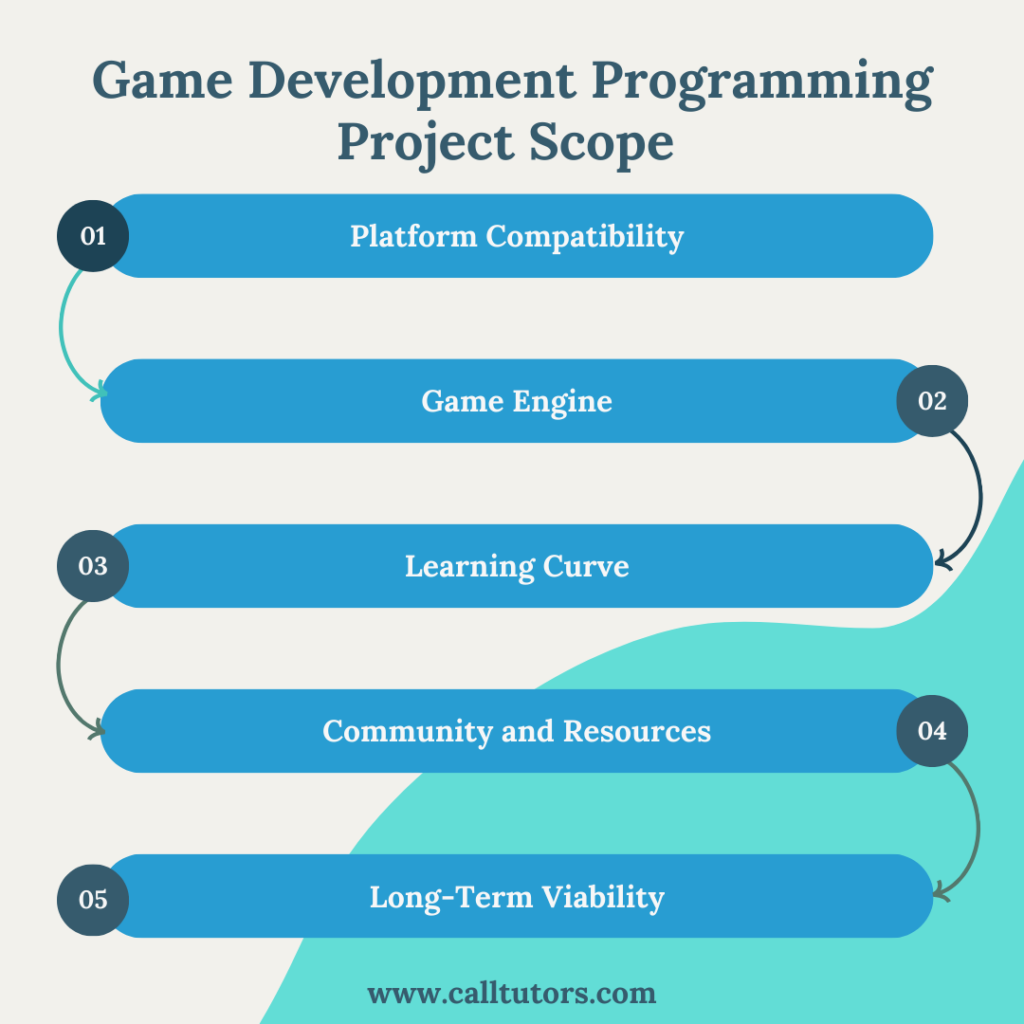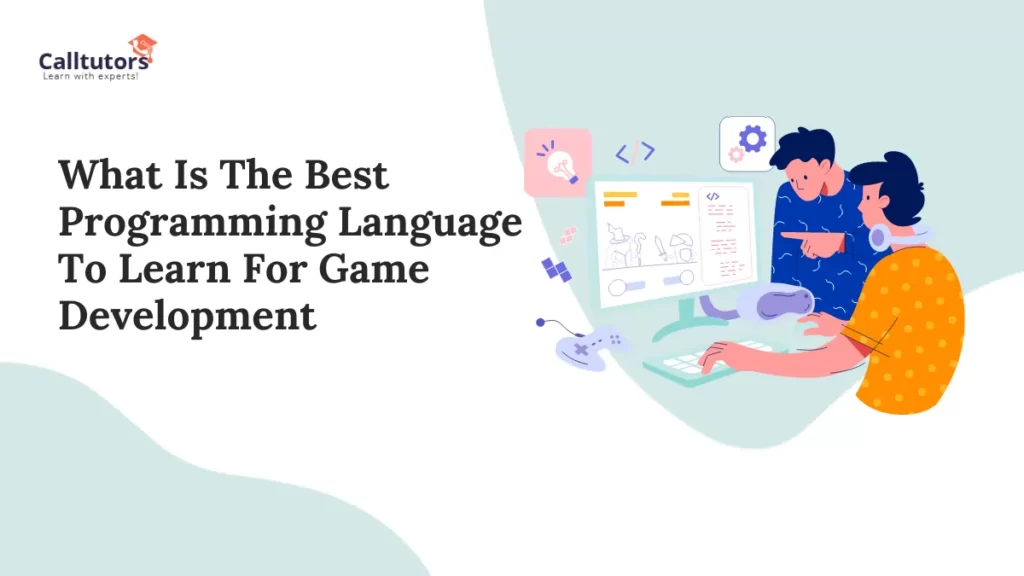Want to develop a game with code but don’t know what is the best programming language to learn for game development?
Do you also want to know the best programming language for game dev? Here we give all of the best programming languages for game development. It helps the students boost their coding skills as well as make them good game developers.
Moreover, learning a coding language can open many exciting career opportunities for computer science students. Mainly there are lots of good fields that attract aspiring programmers. The best fields are game development, cybersecurity, AI, full-stack development, data science, etc.
In this blog, we will explore the best programming languages for game development, understanding the criteria that make them important choices. Also, know how long it might take to learn them.
What Is A Programming Language
Table of Contents
Before diving into the what is the best programming language to learn for game development, let’s begin with a fundamental question: What is a programming language?
A programming language is a set of instructions that allows humans to communicate with computers. These instructions are written in a format that both programmers and computers can understand, enabling us to create software, applications, and much more.
How Long Does It Take To Learn A Programming Language

The time it takes to learn a programming language can vary significantly from one individual to another. Factors such as prior programming experience, the complexity of the language, and the amount of time dedicated to learning all play a role. Generally, it might take a few weeks to a few months to become proficient in a new language, but mastery can take years of practice and real-world application.
Why Is It Important To Think About The Programming Language To Use
Selecting the right programming language is crucial, as it can greatly impact your efficiency, job prospects, and project success. The choice of language can also influence the style and approach you use when solving problems. In game development and cybersecurity, where performance, security, and functionality are critical, this decision becomes even more significant.
- Compatibility: The chosen programming language impacts which platforms and systems your software can run on.
- Performance: Different languages excel in different performance aspects, influencing the speed and efficiency of your software.
- Development Speed: Some languages facilitate rapid development, while others may require more time for coding and debugging.
- Ecosystem: A language’s ecosystem includes libraries, frameworks, and tools that can significantly affect development productivity.
- Community Support: A strong community can provide invaluable resources, assistance, and updates for your chosen language.
- Scalability: Consider how well a language can accommodate future growth and expansion of your software.
- Maintenance: The ease of maintaining and updating your software can vary greatly between languages.
What Is The Best Programming Language To Learn For Game Development
Let’s delve into the exciting world of game development and explore some of the best programming languages for this field:
1. C#

C# is arguably the most popular language for game development, especially for those using the Unity game engine. Unity’s built-in support for C# makes it accessible to both beginners and experienced developers. C# is known for its simplicity and versatility, making it an excellent choice for creating 2D and 3D games across various platforms, including PC, mobile, and consoles.
Advantages:
- Integration with Unity, a popular game engine.
- Easier to learn than C++.
- Strong support for object-oriented programming.
Disadvantages:
- Performance may not match C++ for certain tasks.
- Limited use outside of Unity
2. C++

C++ is a powerhouse in the game development industry. It’s the language of choice for game engines like Unreal Engine and is used in developing many AAA titles. C++ provides low-level control over hardware, making it suitable for resource-intensive projects that demand optimal performance. However, it can be more challenging to learn compared to some other languages.
Advantages:
- Exceptional performance, ideal for high-end graphics and physics.
- Direct access to hardware resources.
- Wide adoption in the industry.
Disadvantages:
- Steeper learning curve, especially for beginners.
- Memory management can be challenging.
- Code can be verbose.
3. Python

While Python might not be the first language that comes to mind for game development, it’s gaining popularity for indie game developers. Python’s simplicity and readability make it an excellent choice for prototyping and building 2D games. Libraries like Pygame and Godot Engine allow developers to leverage Python’s strengths in game development.
Advantages:
- Easy to learn and read.
- Excellent for game prototyping and scripting.
- The abundance of libraries, including Pygame.
Disadvantages:
- Slower performance compared to low-level languages.
- It may not be suitable for graphically intensive games.
4. Java

Java is another versatile language used in game development, primarily for Android game development. The Android operating system relies on Java, making it the go-to language for creating games and apps for the platform. LibGDX is a popular game development framework for Java, providing tools and libraries for 2D game development.
Advantages:
- Portability across platforms.
- Robust ecosystem for Android game development.
- Garbage collection simplifies memory management.
Disadvantages:
- Slower performance compared to languages like C++.
- Limited support for game consoles.
5. JavaScript

JavaScript is commonly associated with web development, but it’s also used for game development. With HTML5 and WebGL, you can create browser-based games that run smoothly on various devices. Game development libraries like Phaser and Three.js have made JavaScript a viable option for building 2D and 3D games for the web.
Advantages:
- Widely used for web-based games and interactive web applications.
- High demand for front-end game developers.
- Access to a vast ecosystem of libraries and frameworks like Three.js for 3D graphics.
Disadvantages:
- Limited performance compared to lower-level languages like C++.
- Browser compatibility issues can be challenging to handle.
6. Lua

Lua is a lightweight and embeddable scripting language often used as a scripting language within game engines. Game developers use Lua to define game logic, AI behavior, and more. Popular game engines like Unity and Unreal Engine offer support for Lua scripting, making it a valuable skill for customizing and extending game functionality.
Advantages:
- Lightweight and easy to integrate as a scripting language.
- A popular choice for modding and extending game functionality.
- Simple syntax and easy-to-read code.
Disadvantages:
- It is not suitable as the primary language for game development.
- Limited use outside of game scripting.
7. Rust

Rust is gaining traction in the game development community due to its focus on safety and performance. It provides memory safety without sacrificing speed, making it an ideal choice for game engines and systems programming. Rust’s ecosystem is expanding, and game development frameworks like Amethyst are making it more accessible for game developers.
Advantages:
- Known for its memory safety and performance.
- Growing popularity in the game development community.
- Excellent support for multi-threading, crucial for modern game engines.
Disadvantages:
- Learning curve for beginners, especially if new to systems programming.
- Smaller community compared to languages like C++ or C#.
8. Haxe
Haxe is a lesser-known language that deserves attention, especially for cross-platform game development. Haxe can target multiple platforms, including HTML5, iOS, Android, and more. Game development frameworks like OpenFL and HaxeFlixel offer powerful tools and libraries for 2D game development with Haxe.
Advantages:
- Cross-platform compatibility: Haxe is renowned for its ability to target multiple platforms, including web, mobile, desktop, and even consoles.
- Strongly typed with modern language features, leading to maintainable and reliable code.
- Extensive support for game engines like OpenFL and HaxeFlixel, which simplifies 2D game development.
- Haxe’s transpiler allows developers to write code in Haxe and then compile it to various target languages, such as JavaScript, C++, or more, depending on the platform.
Disadvantages:
- Smaller community compared to more established game development languages like C++ or C#.
- Limited 3D game development support; it’s primarily focused on 2D games.
- Some learning curve for newcomers to the language and ecosystem, as resources and tutorials may be scarcer compared to more popular languages.
9. Swift

If you’re interested in developing games for Apple devices, Swift is the language to learn. Swift is the primary language for iOS, macOS, watchOS, and tvOS app development. You can create captivating 2D and 3D games for Apple’s platforms using frameworks like SpriteKit and SceneKit.
Advantages:
- Designed by Apple for iOS and macOS app development, making it ideal for creating games on Apple devices.
- Modern syntax and safety features.
- Strong support for 2D and 3D graphics through libraries like SpriteKit and SceneKit.
Disadvantages:
- Limited platform support; primarily geared towards Apple ecosystem.
- Smaller community compared to languages like C++ or C# for cross-platform development.
10. Go (Golang)

Go, also known as Golang, is gaining popularity for server-side game development and networking. It’s a great choice for creating scalable multiplayer games and handling server logic efficiently. Go’s simplicity and robust standard library make it a compelling option for the backend of online games.
Advantages:
- Efficient concurrency support, useful for creating multiplayer and server-based games.
- Growing community and ecosystem for game development.
- Good balance between performance and ease of use.
Disadvantages:
- Less popular than languages like C++ and C#, which may limit job opportunities in some cases.
- Limited support for game engine development compared to more established languages.
Game Development Programming Project Scope and Goals
The choice of programming language should align with your project’s scope and goals. If you’re developing a simple mobile game, a language like Python or JavaScript may suffice. For a complex, high-performance game, C++ or C# might be more suitable.

1. Platform Compatibility
Consider the platforms you want your game to run on. Some languages are better suited for specific platforms, like Java for Android or Swift for iOS. Cross-platform languages like C# and Haxe can save you time and effort by allowing you to target multiple platforms with a single codebase.
2. Game Engine
The game engine you choose can heavily influence your language choice. Unity and Unreal Engine, for example, primarily use C# and C++, respectively. Familiarize yourself with the engines you plan to work with and the languages they support.
3. Learning Curve
Your experience and familiarity with a language should also factor into your decision. If you’re new to programming, you might want to start with a beginner-friendly language like Python or JavaScript before diving into more complex options like C++ or Rust.
4. Community and Resources
A strong community and available resources can be invaluable when learning and troubleshooting. Languages like C#, Python, and JavaScript have robust communities, extensive documentation, and numerous tutorials and forums.
5. Long-Term Viability
Consider the long-term viability of the language you choose. Is it a well-established language with a bright future? Will it continue to be relevant in the game development industry?
Criteria To Consider When Choosing A Programming Language
When deciding on a programming language for game development, several factors come into play:
- Project Requirements: Consider the specific needs of your game, such as graphics, physics, and platform compatibility.
- Community and Resources: Look for a language with an active community and ample learning resources.
- Performance: Assess whether the language can handle the performance demands of your game.
- Learning Curve: Consider your familiarity with programming and the complexity of the language.
- Development Tools: Evaluate the availability of development tools, libraries, and game engines for the chosen language.
How To Learn A Programming Language
Learning a programming language can be a rewarding journey. Here are some steps to get started:
- Select Your Language: Choose a language based on your interests and goals.
- Study Online Resources: Utilize online tutorials, courses, and documentation.
- Practice Regularly: Apply what you learn through coding exercises and small projects.
- Join Communities: Engage with programming forums, meetups, and online communities.
- Work on Real Projects: The best way to learn is by working on real-world projects.
Best Programming Language To Learn For Cybersecurity
Now, let’s shift our focus to the world of cybersecurity. Cybersecurity professionals use various languages for tasks such as penetration testing, ethical hacking, and securing systems. Here are some key languages in this field:

1. Python
Python’s simplicity and extensive libraries make it a top choice for tasks like scripting, network analysis, and automation in cybersecurity.
2. C/C++
These languages are crucial for low-level security tasks, kernel-level programming, and developing security tools.
3. Ruby
Ruby is known for its elegant and concise code, making it suitable for developing web-based security tools and scripts.
4. PowerShell
PowerShell is essential for Windows-based security tasks, allowing for deep integration with the Windows operating system.
Best Programming Language To Learn According to Reddit
Reddit is a valuable platform for gathering insights from a diverse group of programmers. In a Reddit survey conducted among programmers, Python, JavaScript, and Java were commonly recommended as the best programming languages to learn due to their versatility and wide range of applications.
Conclusion
So, that’s all about what is the best programming language to learn for game development. Generally, choosing the right programming language is a crucial step in your journey as a developer, whether you aspire to create engaging games or work in the ever-evolving field of cybersecurity. Consider your project requirements, learning preferences, and career goals when making your choice.
In the world of game development, there is no one-size-fits-all answer to the question of the best programming language. Your choice should align with your goals, project scope, and personal preferences. Learning any of the mentioned languages can be a valuable step toward becoming a proficient game developer.
Keep in mind that the learning process can take time and dedication, but the rewards in terms of career opportunities and personal growth are worth it. So, start your programming journey today, armed with the knowledge of the best languages for your chosen path.
FAQs
Is Python or C# better for game development?
C#’s performance benefits and. NET framework integration makes it a more suitable option.
Should I learn C# or C++ for gaming?
Both C# and C++ can be used to create games. However, C++ has better control hardware on the PC or server.
Why is C# considered as a high-level programming language?
C# language is considered a high-level language because its syntax resembles human language. In other words, it has a high level of abstraction from a machine code



